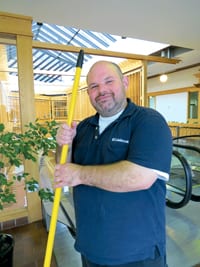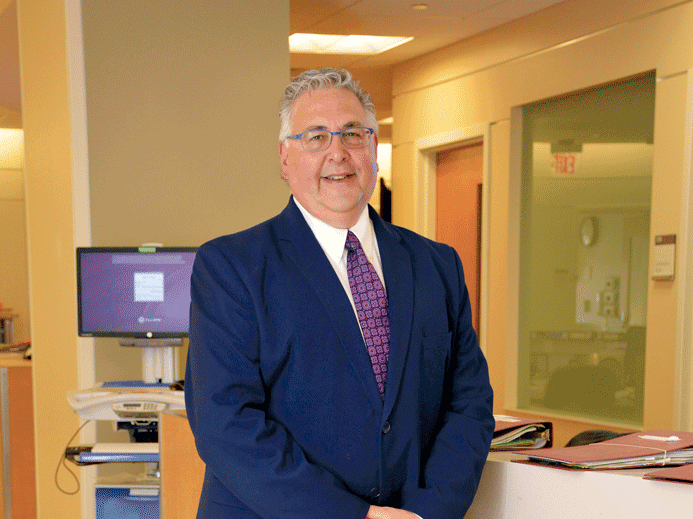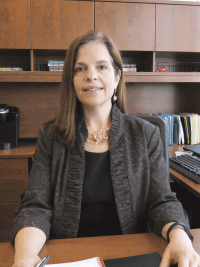Star Power – Sunshine Village Celebrates 50 Years of Creating Great Days
Lenny Recor was in a good mood — or as good a mood as you might expect someone to be in on a Monday morning.
Actually, the day of the week doesn’t seem to matter much to Recor, who appears to wear a smile on an almost permanent basis. And such was the case as he went about his work vacuuming, mopping, dusting, and cleaning bathrooms at 1441 Main St. in Springfield, a.k.a. the TD Bank Building.
“I like to work … it’s meaningful, and I get to meet people and say hello,” said the 39-year-old. “Besides, it’s good to have money in your pocket — really good.”
The ability to work and put money in one’s pocket is something that many people might take for granted, but not Recor.
He has managed to secure several such opportunities thanks to Sunshine Village, the Chicopee-based nonprofit that this year is celebrating a half-century of doing what it does best — creating ‘great days’ for hundreds of individuals with developmental disabilities and help them lead rich, meaningful (there’s that word again) lives.
And these great days come in many forms, said Gina Kos, long-time executive director at Sunshine Village, noting that, for some, it means a day of working and earning. For others, it might mean volunteering at one of a number of area nonprofits. For still others, it might mean using a computer or practicing yoga. And for some, a great day may involve learning to shake hands or hold a spoon.
“A great day is a collection of small, proud moments,” she told HCN, noting that this simple definition covers a significant amount of ground, to be sure. “What goes into ‘great’ depends on the individual.”
Elaborating, she said the agency’s mission, and its mindset, are neatly summed up with a collection of words — a summary, if you will, of what the agency provides for its participants — now filling one wall inside the agency’s administration building:
“Warm welcomes, new skills, shared laughs, many choices, caring staff, friendships, creativity, new experiences, safe travels, big smiles, helping hands, happy people, kind words, unique opportunities, lifelong learning, fun times, teamwork, dedication, shining moments, celebrations, personal accomplishments, sunshine, great days,” it reads … with those last two words in bold red letters.
But it’s not what’s on the wall that defines Sunshine Village, but what goes on inside the walls — and, in Recor’s case and many others, well outside them.
At the hangars and administration buildings at nearby Westover Air Reserve Base, for example, where participants at Sunshine Village have been employed for more than 40 years, handling various cleaning duties. Or at a host of nonprofit agencies such as the Cancer House of Hope, Habitat for Humanity, the Holyoke Soldiers’ Home, and many others. Or at area businesses and office buildings ranging from the Trading Post, a large convenience store just down the street from the agency’s headquarters on Litwin Drive in Chicopee, to the TD Bank building.
And while on the subject of great days, Kos said Sunshine Village strives to provide them for both its participants and the team of employees who serve them.
“We work very hard to be a provider of choice and an employer of choice,” she noted, adding that these are the broad organizational goals outlined in a three-year strategic plan for the agency, one due to be updated in the near future. “And in the third year of our plan, we’ve realized outcomes with both of those goals that have really exceeded our initial expectations.”
For this issue, HCN takes an in-depth look at the Village as it marks a key milestone, and at how, as it looks forward to its next half-century of creating great days, it will continue its evolutionary process.
Bright Ideas
When asked about the circumstances that brought her to the corner office at Sunshine Village, Kos quickly flashed back more than 25 years to the agency’s first annual fund-raising golf tournament at Tekoa Country Club in Westfield.
“I was a volunteer — I drove the beer cart,” she recalled, adding that she had such a good time, and was so impressed with the agency’s mission and how it was met, that she volunteered again the next year.
And through those experiences, Kos, who was, at the time, working in the banking sector, decided she wanted to get involved at a much higher level.
Indeed, she joined Sunshine Village in a marketing position, and a few years later rose to director. She told HCN that, early on, her focus was on putting the agency on a stronger financial footing and enabling it to operate more like a business, or a nonprofit business, to be precise.
“When I came here, people in the human-services world didn’t talk about money,” she noted. “But I said, ‘you need to talk about money.’ And today, I think a lot of organizations follow Sunshine Village’s path of talking about money and acting like a business; in order to achieve your mission, you need to have a solid financial base.”
And while that work continues, she said the primary assignment for the team at Sunshine Village has been to continue a 50-year process of evolution and refinement in order to better meet the needs of those the agency serves and create more of those great days.
This is a broad constituency, individuals 22 and over, for the most part, who have one of many types of development disabilities, including, and increasingly, those on the autism spectrum.
To fully understand this evolutionary process, it’s best to start at the beginning, when a small group of parents of children with developmental disabilities set on a course that would change lives for decades to come.
“These parents were told by their physicians, their lawyers, their families, and friends that they needed to put their children into an institution — either Belchertown State School or the Monson Developmental Center,” she said, adding that they had a different, considerably better idea.
“These families were pretty radical at that time — this was the mid-’60s — and they said, ‘no, institutions are not for us; we’re going to keep our children at home with us,’” she went on. “But they also realized that the resources to help them raise their children weren’t there; they couldn’t go through the school system, and just bringing their kids to nursery schools and the local playground didn’t feel right 50 years ago.”
So this group of parents, under the leadership of Joseph Casey, owner of Casey Chevrolet, who had a young daughter with a developmental disability, started a group called Friends of the Retarded Children and set about creating an organization that would become what Sunshine Village is today.
On land donated by the city and local sportsmen’s club, and with money raised through an involved grassroots effort, a playground and the first building (eventually named after Casey) were built and opened in the spring of 1967.
In its early years, the agency served children, said Kos, noting that it had a nursery school and recreational facilities that reflected playgrounds of that era. As those original participants grew older, the roster of programs evolved accordingly, including the addition of employment services as well as a skills center for those who wanted to work, but needed the skills to do so.
It Takes a Village
Today, Sunshine Village, which has a $13 million annual operating budget, serves roughly 450 adults with developmental disabilities across Western Mass. Many stay with the agency for years or decades, and one participant in its programs recently turned 86.
In addition to its facility in Chicopee, there are other locations in Springfield, Three Rivers, and Westfield, added over the years to bring participants closer to the services being offered.
Day programs provided by the agency cover a broad spectrum. They include:
- Community Engagement Services, also known as community-based day services, or CBDS, which offer individuals activities promoting wellness, recreation, community engagement, technology, self-advocacy, and personal development;
- Contemporary Life Engagement Services, a highly structured program specifically designed to support individuals on the autism spectrum. This is a medically based day ‘habilitation’ program with services augmented with clinical supports as necessary, including speech and language, physical, and occupational therapies, and access to a board-certified behavior analyst;
- Traditional Life Engagement Services, a medically based day habilitation program focused on building functional life skills, including social, communication, personal wellness, and independent living; and
- Employment Services, which support participants in obtaining a job or working as a member of a supervised team. It does this through placement services, and also through Village Works, an agency-owned business located just off exit 6 of the Turnpike, as well as Westover Maintenance Systems, a commercial cleaning company operated by Sunshine Village, which, as noted, provides maintenance services for all the buildings and hangars at Westover Air Reserve Base.
Over the years, and on an ongoing basis, the programming at the Village evolves to meet changing needs within society and area school departments and their special-education divisions, said Kos.
“Over the years, we’ve offered different kinds of services — residential services, shared-living services, different kinds of day and employment services — but we’ve always remained true to our mission,” she told HCN. “And that is to serve people with disabilities and to serve them regardless of the level of disability; we’ve served people that other organizations can’t and won’t serve.”
As one example of this evolutionary process, she noted additions and changes undertaken to meet the dramatic rise in the number of individuals on the autism spectrum.
“There are a lot more people graduating from area high schools who are on the autism spectrum,” she explained, adding that the reasons for this are not fully known. “And on the autism spectrum, 40{06cf2b9696b159f874511d23dbc893eb1ac83014175ed30550cfff22781411e5} of the individuals also have an intellectual disability, meaning their IQ is less than 71.
“And one of the things we’re doing at Sunshine Village is redefining and redesigning our services so that we’re able to meet the needs and support people on the autism spectrum who do not have intellectual disabilities,” she went on, “because that is a growing need in the community.”
It’s also an example of how the agency is constantly listening to the constituencies it serves when they’re asked about needs and concerns — and responding to what it hears.
These traits have certainly benefited the agency as it works toward that goal of being a provider of choice, said Kos, adding that the same is true when it comes to being an employer of choice.
Elaborating, she said the competition for talent in the nonprofit sector is considerable, and Sunshine Village looks to stand out in this regard by working hard to enable employees to shine as well as those they serve.
“We see our employees as our best asset, and we invest a lot of money in training, recognizing, and thanking them,” she said of her team of more than 250.
Shining Examples
Kos said the official 50th anniversary date for the agency was in April of this year, and in many respects it has been a year-long celebration.
There was a dinner for employees last spring, several outreach events, and a community celebration in September, called, appropriately enough, the ‘Great Days Gala,’ that was attended by more than 250 people.
But in most all ways, Sunshine Village has been celebrating 50 years by doing more of what it’s been doing for 50 years — enabling people with developmental disabilities to shine.
And as HCN talked with some of the clients served by the agency, it became clear that there are many ways for that verb to manifest itself.
For Jonathon Scytkowski, a participant in the CBDS programs who came to Sunshine Village in 2015, there are several components to his great days. He works at the Trading Post, cleaning floors, taking out the recyclables, and other duties. Meanwhile, he also volunteers at the Food Bank of Western Massachusetts and other nonprofits, and takes visits to the libraries in Chicopee and South Hadley and area malls.
Add it all up, and he’s busy, active, and, most importantly, involved.
“I like volunteering — at the Food Bank I do a lot of volunteering putting food in boxes for those who need it,” he told HCN, noting, like Recor did, that working is important on many levels, from making money to having a sense of purpose.
Those sentiments were echoed by Denise Simpkins and Bill Debord, who have both worked at Westover, through Sunshine Village, for several years.
In fact, for Debord, it’s been almost 30 years, long enough to see a number of personnel come and go, but also long enough to feel like he’s part of that important operation.
“I really like working there — you feel like you’re part of the family,” he said, adding that he knows people by name, and vice versa.
As for Simpkins, who has been doing it for 12 years, she likes the work, the pay, and especially the perks — like the special occasions where she gets to see the planes close up and take some pictures.
“It’s good to have a job because you get to pay you bills and manage your money,” she told HCN.
Meanwhile, for Kori Cox, another participant in the CBDS program, shining, if you will, takes a different form.
Indeed, as part of initiative called Positive Behavior Supports (PBS), she said she has an important role she described this way. “I do a lot of stuff to try to prevent the Village from being negative.”
Elaborating, she said she made a sign that reads “Positive Attitude, Positive Life,” and she works to encourage others, inside and outside Sunshine Village, to not only read the sign, but live by those words. Specifically, she works diligently to prompt people to stop using the ‘R’ word.
“We remind people that’s not nice to use that word — ever,” she said, adding that her efforts in this regard dovetail nicely with her broader mission.
“I love positivity — it really helps life; there’s no negativity,” said Cox, 24, who described herself as an ambassador, advocate, and peer leader.
As for Recor, well, let’s just say he seems to embody the words on Cox’s sign.
A World of Difference
Sunshine Village still stages a golf tournament every year. In fact, it’s the agency’s most successful fund-raising effort.
Its new, permanent home is Chicopee Country Club — only a drive and a wedge away from the Litwin Drive campus — and Kos no longer drives the beer cart, obviously.
Her role has evolved and grown — as has the agency’s.
But the basic goals are still the same — to create great days and enable those with developmental disabilities to shine, however those words are defined.
Half a century later, Sunshine Village is delivering on those promises.
Just ask Lenny Recor. He’s the guy with a smile on his face — on a Monday morning no less.





Comments are closed.